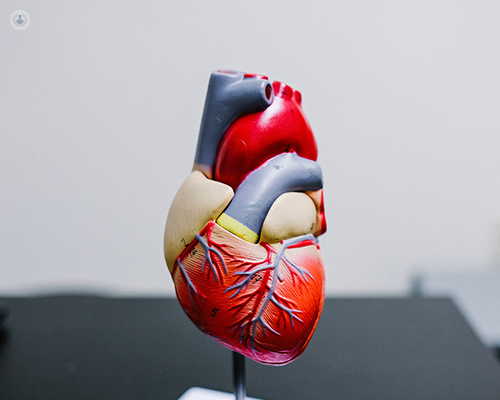Palpitations: Understanding the heart's unexpected beat
Escrito por:
Palpitations are a common yet often unsettling experience, characterised by the sensation of an irregular or forceful heartbeat. While they are frequently harmless, they can sometimes indicate underlying medical issues that require attention.
Dr Gosia Wamil, internationally-recognised consultant cardiologist, explores the causes, symptoms, diagnosis, and management of palpitations to help demystify this phenomenon.

What are palpitations?
Palpitations refer to the awareness of one’s heartbeat, which may feel like fluttering, pounding, skipping, or racing. These sensations can occur at rest, during activity, or at random times. Palpitations may last for a few seconds or persist for minutes, causing varying degrees of discomfort or anxiety.
Common causes
Palpitations can be caused by a variety of factors, including:
Lifestyle factors
- Stress and anxiety: Emotional stress or panic attacks can trigger palpitations through the release of adrenaline.
- Stimulants: Excessive caffeine, alcohol, nicotine, or recreational drugs can overstimulate the heart.
- Exercise: Intense physical activity temporarily increases heart rate.
Medical conditions
- Arrhythmias: Irregular heart rhythms, such as atrial fibrillation or ventricular tachycardia, can cause palpitations.
- Structural heart disease: Conditions like hypertrophic cardiomyopathy or mitral valve prolapse may lead to irregular heartbeats.
- Thyroid disorders: Hyperthyroidism (overactive thyroid) can accelerate the heart rate.
- Anaemia: Low red blood cell levels can strain the heart, leading to palpitations.
- Electrolyte imbalances: Abnormal levels of potassium, magnesium, or calcium can affect the heart’s electrical system.
Medications and substances
- Certain medications, such as decongestants, asthma treatments, or antidepressants, may provoke palpitations.
- Over-the-counter supplements or herbal remedies, like ginseng or ephedra, can also contribute.
Hormonal changes
- Hormonal fluctuations during pregnancy, the menopause, or menstruation may trigger palpitations.
When to seek medical attention
Although most palpitations are benign, certain symptoms require medical attention, including:
- Palpitations that persist for more than a few minutes.
- Palpitations accompanied by chest pain, shortness of breath, dizziness, or fainting.
- A personal or family history of heart disease or abnormal heart rhythms.
Diagnosis
If you experience palpitations, a cardiologist, will typically begin with a detailed medical history and physical examination. Diagnostic tests may include:
- Electrocardiogram (ECG): A test that records the heart's electrical activity.
- Holter monitor: A portable ECG worn for 24-48 hours to detect intermittent irregularities.
- Event monitor: A device used for several weeks to record palpitations as they occur.
- Echocardiogram: An ultrasound imaging test used to evaluate the heart's structure and function.
- Blood tests: To detect thyroid disorders, anaemia, or electrolyte imbalances.
- Stress testing: To evaluate how the heart responds to exercise.
Management and treatment
The treatment of palpitations involves addressing their underlying cause:
- Lifestyle changes: Limiting caffeine and alcohol consumption, smoking cessation, and using stress management techniques such as yoga or meditation. In addition, ensuring adequate hydration and electrolyte balance.
- Medications: Medications such as antiarrhythmic drugs, beta blockers, or calcium channel blockers may be prescribed to treat arrhythmias.
- Procedures: For serious arrhythmias, procedures like catheter ablation or the placement of a pacemaker may be necessary.
If no underlying condition is identified, reassurance and lifestyle changes are often adequate.
Preventing palpitations
To reduce the likelihood of experiencing palpitations:
- Adopt a healthy lifestyle with regular physical activity and a well-balanced diet.
- Reduce stress by practising relaxation techniques and ensuring adequate sleep.
- Avoid excessive caffeine, alcohol, and stimulants.
- Keep underlying medical conditions like hypertension or thyroid disorders under control.
Palpitations are a common symptom that can vary, from being benign to indicating a serious underlying condition. Understanding their causes and seeking timely medical evaluation when needed can ensure proper management and peace of mind. By making healthy lifestyle choices and staying informed, you can keep your heart in rhythm and your worries at bay.
If you would like to book an appointment with Dr Gosia Wamil, head on over to her Top Doctors profile today.


